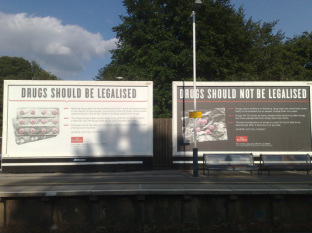
Firstly there are the stated aims of legalisation. Top cops of course like to highlight the reduction in organised crime. Drugs legalisation advocates of various hues tend to soft-pedal this angle over a general belief that the state should play no significant role in what citizens choose to inject, sniff, smoke or otherwise ingest to get their rocks off. The headlines tell us drugs only lead to addiction and death and that legalisation would simply lead to increased use and a generation who would thus treat substance abuse in the same way they do alcohol. Too late. This has been a feature of my parents generation, of mine and that of my children. In fact, drugs were much easier to obtain than alcohol when I was 16 and considerably cheaper.
The Home Office expresses the perpetual view of all Governments cowed by the task of allowing the commercial or medicinal exploitation of drugs: "Drugs are illegal because they are dangerous. They destroy lives and blight communities. The UK's approach on drugs remains clear, we must help individuals who are dependent by treatment, while ensuring law enforcement protects society by stopping the supply and tackling the organised crime that is associated with the drugs trade." Well, good luck with that pious mixture of hubris and delusion. One notorious member of a family of gangsters grown fat on exploitation of a lucrative Colombian drugs cartel that reportedly owned its own submarine, was fined a million pounds and reportedly asked the Judge with a wry smile if he preferred cash or a cheque. The fight against organised crime has been a pathetic drop in the ocean in a war in which the culprits are more likely to eliminate each other from the growing empires of organised crime in the endless power plays between the controlling syndicates than to succumb to a knock on the door from an under-funded constabulary.
In 2009, the lobby group Transform Drug Policy Foundation’s report 'After the War on Drugs: Blueprint for Regulation' financed partly by, amongst others, the J. Paul Getty Jr. Charitable Trust was careful to highlight the difference between drug use and drug addiction or dependency using the usual arguments every teenager caught with a quarter of dope in their laundry by their parents utilises when backed into a corner. Alcohol, caffeine, anti-depressants, tobacco make us all drug users to a greater or lesser degree and all are legal.
It’s always been a convincing argument, particularly when walking home late on a Saturday night or Sunday morning in any major town centre. There is a striking feature about wandering around London in the early hours that is as regular a sight as rubbish trucks growling down the streets at dawn. The city bus stops are full of young women alternately crying or throwing up. Their male counterparts always seem to be missing, perhaps not as resilient or more incapable having a greater capacity if not tolerance for gallons of the electric soup.
But what police advocates of legalisation through the NHS seem to forget is that most drug use is recreational. Far from being wrinkled husks gasping for another hit and queuing for the chemist to collect their methadone prescriptions, most are casual, occasional and social users who regard their substance of choice as just another choice amongst the panoply of prerequisites for a good night out.
Given this subtlety, it’s easy to see how organised crime would adapt to changing legislation by cornering the market in new designer highs that can’t be found amongst the prescribed versions that would be available through the health system or even over the counter at your local chemist. The model that seems to suggest a way to completely circumvent them or at least put a serious dent in their business is the free market or supermarket model that suggests commercially available through licensed premises, off-licence models aligned to those for alcohol or caffeine energy drinks. This has the disadvantage of doing little more than handing control of the market from an underground cartel of loosely associated and competing criminal exploitation specialists to suppliers with an advertising budget. But given the worship of free markets over state intervention, this may well be where it all ends up. Tobacco advertising bans will dissolve under the weight of such a prospect, which would suggest the cigarette lobbyists should be hyping this as the panacea to a wealth of schizophrenic state proscriptions.
But what would a commercial drugs company with advertising dollars to spend and a research and development department dedicated to producing market-friendly innovations and designer highs to all price bands and demographics look like? Whilst the current atmosphere persists, it is possible that we may all soon be about to find out.
 RSS Feed
RSS Feed